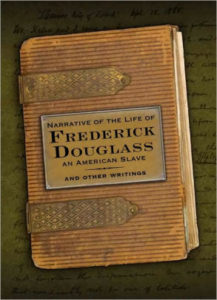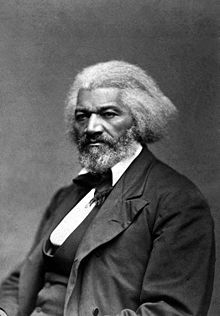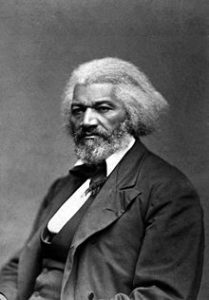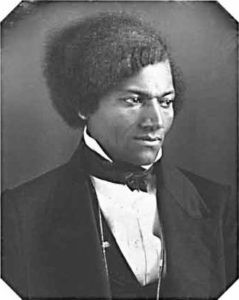Book Review: Narrative of the Life of Frederick Douglass, an American Slave and Other Writings
Blurb:
“This dramatic autobiography of the early life of an American slave was first published in 1845, when its young author had just achieved his freedom. Douglass’ eloquence gives a clear indication of the powerful principles that led him to become the first great African-American leader in the United States.”
Welcome to Black History Month!
I always look forward to February and March because it puts the spotlight on two marginalized groups in history. As a history geek, I would prefer that we didn’t need those spotlights, but given the current political backlash against all “others,” I don’t think we’ll be reaching that point soon. So one of my contributions this year is a review of the venerable autobiography of Frederick Douglass, an escaped american slave, abolitionist, preacher and revered leader of the African American community. As a scholar of ancient history, I value primary sources (which are few in my chosen time of 5C Rome). This autobiography is a precious record of a troubling period in our American History from a man who experienced it first hand. This is a classic of American literature and a rebuke to all folks who insist that the Civil War was fought over “heritage.”
The Narrative
In Narrative of the Life of Frederick Douglass An American Slave and Other Writings (the Fall River Press edition), Douglass gives us an unvarnished account of life under slavery. He addresses not only the horrific physical abuses of slavery, but writes with poignancy about the moral and spiritual decay that slavery brings to slave holders. He demolishes one by one original excuses and apologies such as “the slaves were well-cared for because they were valuable property” or “the inferior negro race needed whites to guide them and save their heathen souls.”
Douglass recounts a story of a slave sold south because he answered honestly when asked if his master treated him well. (He didn’t.):
“The slaveholders have been known to send in spies among their slaves, to ascertain their views and feelings in regard to their condition. The frequency of this has had the effect to establish among the slaves the maxim, that a still tongue makes a wise head…I have been frequently asked, when a slave, if I had a kind master, and do not remember ever to have given a negative answer…”
His own words on arriving in New York City:
“I have often been asked, how I felt when first I found myself on free soil. And my readers may share the same curiosity. There is scarcely anything in my experience about which I could not give a more satisfactory answer. A new world had opened upon me. If life is more than breath, and the ‘quick round of blood,’ I lived more in one day than in a year of my slave life. It was a time of joyous excitement which words can but tamely describe. In a letter written to a friend soon after reaching New York, I said: ‘I felt as one might feel upon escape from a den of hungry lions.’ Anguish and grief, like darkness and rain, may be depicted; but gladness and joy, like the rainbow, defy the skill of pen or pencil.”
Other Writings
This edition includes several essays and presentations by Douglass including a detailed account of his escape from slavery which he didn’t include in his initial “Narrative” because those that helped him were still living in slave states and might be punished. I particularly liked his “Oration Delivered on the Occasion of the Unveiling of the Freedmen’s Monument (In Memory of Abraham Lincoln, in Lincoln Park Washington, D.C, April 14, 1878)” which reminded his black audience that in spite of:
“…the exalted character and great works of Abraham Lincoln, the first martyr President of the United States…He was preeminently the white man’s President…ready and willing at any time during the first years of his administration to deny, postpone and sacrifice the rights of humanity in the colored people to promote the welfare of the white people of this country. In all his education and feeling he was an American of the Americans. He came into the Presidential chair upon one principle alone namely the opposition to the extension of slavery.”
It’s an interesting (and by all accounts accurate) take by a contemporary of Lincoln. The words made me flinch, even though I’ve read several modern biographies which support Douglass’ conclusions. Lincoln was a remarkable man, but he was a man of his times. It’s good to put history in perspective.
A number of the essays become a bit repetitious in tone and content, which is to be expected. In my opinion, the major weakness of the volume is the inclusion of a modern introduction to the book which only summarized the “Narrative”–why bother?–Douglass did a great job of telling his own story. The Preface included two letters by white abolitionists William Lloyd Garrison and Wendell Phillips which now feel condescending, but at the time must have been necessary to assure (white) readers that this narrative was true and the author worth listening to. In the end, I was glad for the extra material and would recommend finding an edition that includes the “Other Writings.” In summary, this should be required reading in all high school American history classes. I’m not holding my breath.
The Details:
 Title: Narrative of the Life of Frederick Douglass an American Slave and Other Writings
Title: Narrative of the Life of Frederick Douglass an American Slave and Other Writings
Author: Frederick Douglass
Publisher: Fall River Press (202 pages)
ISBN: 978-1435117921
Availability: All the original material is available in the public domain; borrow a copy from your local library or download a copy online. There are many print versions in all price ranges available in bookstores and online.


